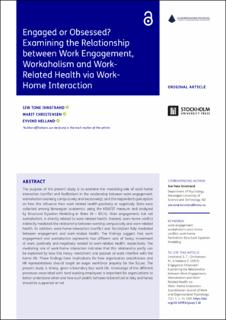| dc.contributor.author | Innstrand, Siw Tone | |
| dc.contributor.author | Christensen, Marit | |
| dc.contributor.author | Helland, Eyvind | |
| dc.date.accessioned | 2023-02-27T15:59:42Z | |
| dc.date.available | 2023-02-27T15:59:42Z | |
| dc.date.created | 2022-02-07T19:31:04Z | |
| dc.date.issued | 2022 | |
| dc.identifier.citation | Scandinavian Journal of Work and Organizational Psychology. 2022, 7 (1), 1-14. | en_US |
| dc.identifier.issn | 2002-2867 | |
| dc.identifier.uri | https://hdl.handle.net/11250/3054406 | |
| dc.description.abstract | The purpose of the present study is to examine the mediating role of work-home interaction (conflict and facilitation) in the relationship between work engagement, workaholism (working compulsively and excessively), and the respondents perception on how this influence their work-related health positively or negatively. Data were collected among Norwegian academics using the KIWEST measure and analyzed by Structural Equation Modelling in Stata (N = 6014). Work engagement, but not workaholism, is directly related to work-related health. Instead, work-home conflict indirectly mediated the relationship between working compulsively and work-related health. In addition, work-home interaction (conflict and facilitation) fully mediated between engagement and work-related health. The findings suggest that work engagement and workaholism represents two different sets of heavy investment at work, positively and negatively related to work-related health, respectively. The mediating role of work-home interaction indicates that this relationship partly can be explained by how this heavy investment and passion at work interfere with the home life. These findings have implications for how organization practitioners and HR representatives should target an eager workforce properly for the future. The present study is timely, given a boundary less work life. Knowledge of the different processes associated with hard working employees is important for organizations to better understand when and how such prolific behavior is beneficial or risky and hence should be supported or not. | en_US |
| dc.language.iso | eng | en_US |
| dc.publisher | Stockholm University Press | en_US |
| dc.rights | Navngivelse 4.0 Internasjonal | * |
| dc.rights.uri | http://creativecommons.org/licenses/by/4.0/deed.no | * |
| dc.title | Engaged or Obsessed? Examining the Relationship between Work Engagement, Workaholism and Work-Related Health via Work- Home Interaction. | en_US |
| dc.title.alternative | Engaged or Obsessed? Examining the Relationship between Work Engagement, Workaholism and Work-Related Health via Work- Home Interaction. | en_US |
| dc.type | Peer reviewed | en_US |
| dc.type | Journal article | en_US |
| dc.description.version | publishedVersion | en_US |
| dc.source.pagenumber | 1-14 | en_US |
| dc.source.volume | 7 | en_US |
| dc.source.journal | Scandinavian Journal of Work and Organizational Psychology | en_US |
| dc.source.issue | 1 | en_US |
| dc.identifier.doi | 10.16993/sjwop.138 | |
| dc.identifier.cristin | 1998768 | |
| cristin.ispublished | true | |
| cristin.fulltext | original | |
| cristin.qualitycode | 1 | |

